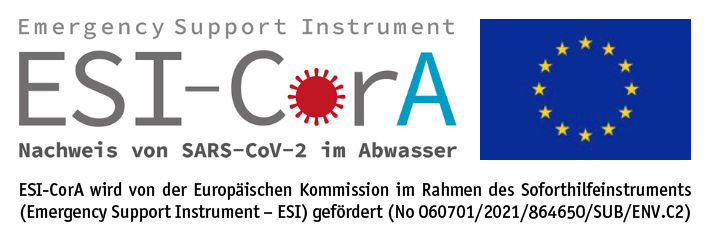
Systematic monitoring of SARS-CoV-2 in wastewater
Systematic monitoring of SARS-CoV-2 in wastewater -
Jena is the pilot site of a research project
- Testing of new monitoring methods for infection events necessary
- Detection of pathogens in wastewater is currently being implemented
- Jena is one of 20 cities in the EU-funded pilot project
During the corona pandemic, the limits of previous monitoring methods for infection incidents have become apparent. A large number of staff were required to investigate cases, containment measures could sometimes only be introduced too late and, at peak times, infections were only reported with a long delay due to laboratory overload.
For this reason, alternatives to the previous measures of systematic infection detection are being researched. One of these is wastewater-based surveillance, i.e. the examination of wastewater samples to analyze the spread of certain infectious agents. The EU is therefore funding such concepts. The Federal Ministry of Health (BMG), the Federal Ministry for the Environment, Nature Conservation, Nuclear Safety and Consumer Protection (BMUV) and the Federal Ministry of Education and Research (BMBF) have joined forces for a national pilot project "ESI-CorA: Systematic surveillance of SARS-CoV-2 in wastewater" (running from November 2021 to March 2023). The two higher federal authorities RKI and the Federal Environment Agency (UBA) are involved as project partners. The national project is coordinated by the project sponsor, the Karlsruhe Institute of Technology (KIT).
20 German cities are involved in the pilot project - Jena is one of them. Here, the Health Department is cooperating with the Jena Water/Wastewater Association and a commissioned analytics laboratory (SGS Analytics). Since mid-May 2022, wastewater has been sampled twice a week at the Kunitz wastewater treatment plant. The samples are taken by the sewage treatment plant employees and sent to the analytics laboratory, which carries out the tests for the SARS-CoV-2 virus and sends the results to the health department.
During the course of the project, not only are tests planned for the detection of SARS-CoV-2, but sequencing tests will also be carried out at TU Darmstadt to determine the virus variants currently circulating in our wastewater. It is hoped that this will provide indications of a possible virus variant change (e.g. Omikron to Delta) in advance. In comparable series of measurements in the Berchtesgadener Land region, changes in the incidence of infection were already recognizable 10 days before the official case numbers.
The EU-funded project is intended to support the implementation and evaluation of the Europe-wide SARS-CoV-2 wastewater monitoring recommended by the EU in Germany. This provides the city of Jena with a scientific indicator that can be a valuable pandemic management tool for the work of the crisis management team in the future. Systematic SARS-CoV-2 wastewater monitoring also makes it possible to obtain an overview of the SARS-CoV-2 viruses circulating in the Jena population , even in pandemic phases with low incidences in which it is difficult to monitor symptomatic patients.
In the future, however, wastewater monitoring can also be used to detect other pathogens such as influenza viruses (flu viruses), polioviruses or animal disease pathogens. In the future, this method can also be used to detect and track the occurrence of antibiotic-resistant pathogens or to detect other hazardous substances such as drugs, medicines, heavy metals, etc.

